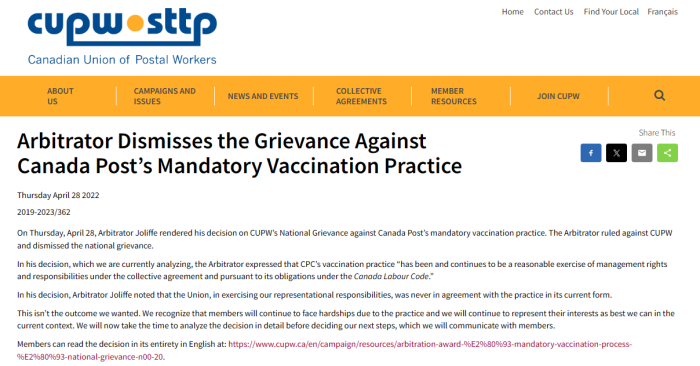
The Federal Court has just thrown out a lawsuit from various Canada Post workers, which challenged the 2021 “injection mandates”. This was a change to the job requirements that applied to everyone. The union eventually forced the matter to arbitration, which the workers lost. See the archives here and here for more information.
The Claim originally had 281 Plaintiffs, but 132 of them discontinued prior to the Motion to Strike being heard. That was nearly half of them.
Like most (or all) Government workers and/or unionized workplaces, there are collective bargaining agreements. These agreements allow for grievances to be filed, and that can lead to arbitration. They typically don’t allow for litigation. Canada Post is one such employer.
Now, if the arbitration process was unfair or corrupted, in theory the workers could have gone to the Court and asked for a review. This would be analogous to filing an Appeal. If serious errors were found, the case could be sent back for a new hearing.
Instead, a few hundred of them ended up suing Canada Post, and the Federal Government. They found a lawyer who apparently convinced them that the the arbitration requirement (and result) didn’t matter. And quite predictably, the case was thrown out for lack of jurisdiction.
The lawsuit had many problems, some of which were fatal.
- Going to Court when collective agreements require other alternatives
- Suing after arbitration is already completed
- Not properly pleading facts and particulars
- Having a Claim that’s difficult to follow
- Not understanding jurisdiction of Crown Corporations
Surprisingly, this didn’t come from “Mr. Bad Beyond Argument”. It was from a firm called Grey Wowk Spencer, and its lawyer, Leighton Grey.
In fairness, the Claim was written a lot more clearly than what usually gets critiqued here. The pleading was (mostly) coherent, and it wasn’t that difficult to follow along.
However, there were still serious errors throughout the litigation process. These were the kinds of mistakes that senior lawyers should never be making. In matters such as these, no one’s work is above criticism.
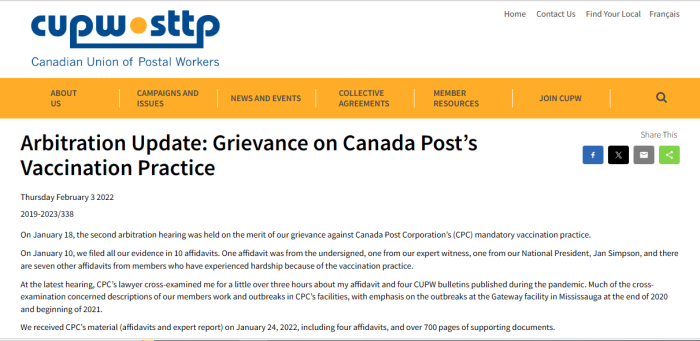
It’s important to remember that this didn’t start with a lawsuit. It began with grievances and then arbitration. This matters as it relates to the lack of jurisdiction of the Federal Court.
September 2021: Canada Post announces that it will change the “vaccination” policy, requiring that all employees (and new hires) take the shots in order to be employed. It’s to take effect on November 26th, 2021.
October 26th, 2021 mandatory injection policy is formally approved.
November 15th, 2021: CUPW, Canadian Union of Postal Workers, files grievance against Canada Post’s new policy of requiring the injections in order to stay employed.
January 18th, 2022: Arbitration hearing is held over Canada Post’s policy requiring the injections of all employees. There would be several sessions over the coming months.
January 24th, 2022: Canada Post’s lawyer serves some 700 pages of material related to the arbitration hearings.
February 12th, 2022: Hearing date for arbitration related to Canada Post. Colin Furness, who works for the University of Toronto, testifies.
March 21st, 2022: Hearing date for arbitration related to Canada Post.
March 22nd, 2022: Hearing date for arbitration related to Canada Post.
April 5th, 2022: Final arguments were to be held for arbitration process.
April 27th, 2022: Arbitrator dismisses the grievance against Canada Post, saying that the injection requirement is “reasonable”.
Note: the following information is posted on the Federal Court of Canada website. These steps are from their notes on how things have been progressing. This lawsuit came AFTER arbitration had taken place. Instead of challenging the validity or fairness of the arbitration, it acts as though it never happened.
July 12th, 2022: Statement of Claim is filed with the Federal Court. It names: (a) Canada Post Corporation; (b) Her Majesty the Queen, as Elizabeth was Queen at the time; and (c) Attorney General of Canada.
July 18th, 2022: A Notice of Intention to Respond is filed.
November 3rd, 2022: Defendants send correspondence asking for case management, and to suspend normal timelines to file a Defence.
November 23rd, 2022: Associate Judge Catherine A. Coughlan is assigned to manage the case.
January 16th, 2023: Plaintiffs provide letter for dates for case management conference.
April 6th, 2023: Case conference is delayed until May 31st.
May 31st, 2023: Plaintiffs directed to file Amended Statement of Claim by June 15th.
June 19th, 2023: Plaintiffs file Amended Statement of Claim.
July 7th, 2023: Dates are set down for Defendants’ Motions to Strike (throw out the case), and the following deadlines were established. Worth mentioning, these kinds of Motions are done in many steps.
- August 18th: Defendants serve (but not file) Notice of Motion, and any Affidavit evidence
- September 15th: Plaintiffs serve (but not file) any Affidavit evidence
- October 27th: Any cross-examinations on Affidavits is to have finished. This is similar to a Court setting, where a person gets asked about evidence that they submit. Failure to attend means evidence won’t be considered.
- November 17th: Moving Party Defendants are to submit their Motion Records, which is a collection of documents. In Federal Court, it also includes the written arguments, or submissions
- December 8th: Responding Plaintiffs to serve and file their Motion Record(s)
- January 23rd-25th, 2024: Court to hear the Motions
July 10th, 2023: Lawyer for Canada Post contacts the Court and advises a lack of availability for the week in January when the hearing is to take place.
September 5, 2023: Even more Plaintiffs discontinue, or voluntarily leave the case. It worth mentioning that the Court history is filled with various Plaintiffs discontinuing. This is especially prevalent after the Motion to Strike is set out. Seems they realize that their case will go nowhere.
March 4th, 2024: Motions are eventually heard.
March 13th, 2024: Court releases reasons for striking the case.
March 15th, 2024: Order striking case is officially issued.
It’s disappointing that neither the lawsuit nor the grievance really challenged the pseudo-science that was going on here. Instead, it’s limited to worker rights, and the declarations of “the experts”.
Now we get to some of the problems that the case had. To be blunt, it was a gong-show, and was never going to reach Trial. And to be frank, NONE of these issues are new or novel. They’ve all been dealt with many times before.
Problems include:
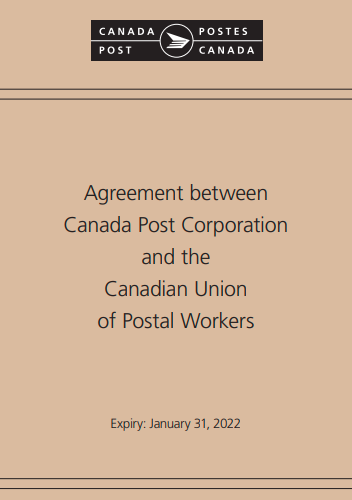
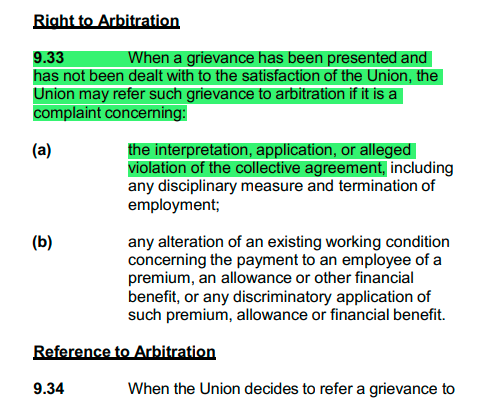
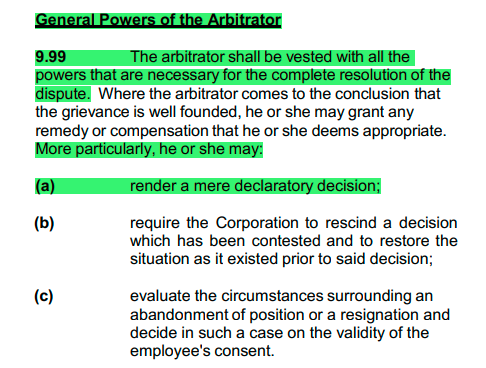
CUPW is covered by their collective bargaining agreement. See archive. Article 9 is very long, and goes into depth about the grievance process. If disputes cannot be resolved, then the normal course is to go to arbitration. And in fact, that’s exactly what happened here.
Article 9.99 covers “declaratory relief”, which is something that so-called constitutional lawyers almost always try to claim. In fact, it’s claimed in this case. The Arbitrator is given wide range to adjudicate over nearly type of employment dispute.
But instead of challenging the fairness or adequacy of the hearings (i.e. review or appeal), the lawsuit acts as if they never happened. Consequently, this case was doomed to fail.
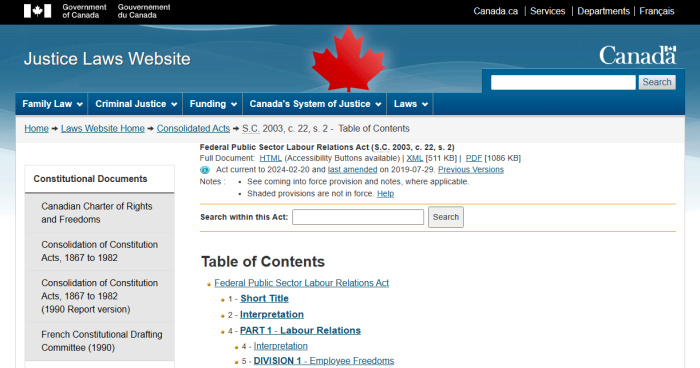
[47] As noted at the outset of these Reasons, Canada Post advances two distinct arguments asserting this Court has no jurisdiction to entertain the Claim.
[48] First, it argues that as a Crown Corporation, the Federal Court lacks jurisdiction over Canada Post pursuant to sections 17(1), 17(2) and 17(5) of the FCA. Citing the oft-quoted decision in ITO-Int’l Terminal Operators v Miida Electronics, [1986] 1 SCR 752 (SCC), Canada Post argues that none of the three-part test for jurisdiction is met: There is no statutory grant of jurisdiction by the Federal Parliament; there is no existing body of federal law which is essential to the disposition of the case and which nourishes a statutory grant of jurisdiction; and this is not a case based on the “law of Canada” under section 101 of the Constitution Act, 1867.
[49] Further, Canada Post relies on the recent decision of Associate Judge Horne in Van Sluytman v Canada, 2022 FC 545 at para 56, for the proposition that section 17 of the FCA only applies to the Crown, eo nomine (by its name), and not to statutory corporations acting as agent for the Crown: Committee for Monetary and Economic Reform v Canada, 2014 FC 380 at paras 87-88; affirmed 2015 FCA 20.
[50] In its responding memorandum of fact and law, the Plaintiffs do not address this argument
directly. Rather, they assert that the Federal Government acting under statutory and constitutional
law effectively controls Canada Post. To bolster their position, they point to section 91(5) of the Constitution Act where the Government of Canada has exclusive authority over postal services. Any arguments that suggest that Canada Post is not an agent of the Federal Government, the Plaintiffs say, amounts to “legal sophistry”.
The requirement to go through the grievance process was addressed in the previous section, but it’s not the only problem that the former workers have to deal with.
Apparently, it’s been settled law for many years that the Federal Court doesn’t have jurisdiction to preside over cases involving Crown Corporations. This applies even though Ottawa does hand down some rules relating to how they can operate.
Of course, even if Canada Post were part of the Federal Government, there still wouldn’t be jurisdiction to sue. Sections 208 and 236 of the FPSLRA, Federal Public Sector Labour Relations Act, allow employees to grieve but not to litigate. In other words, the Court would still lack jurisdiction.
By the way, Committee for Monetary and Economic Reform v Canada (a.k.a. COMER, or the Bank of Canada case), was struck for lack of jurisdiction. It was also struck multiple times for failing to state a cause of action, by “Mr. Bad Beyond Argument”.
The Attorney General of Canada was removed since the directive to mandate injections only went to the Federal Government, not to Crown Corporations. The case against Canada was also struck. However, this comes across as unfair, since Canada Post still implemented the policy anyways.
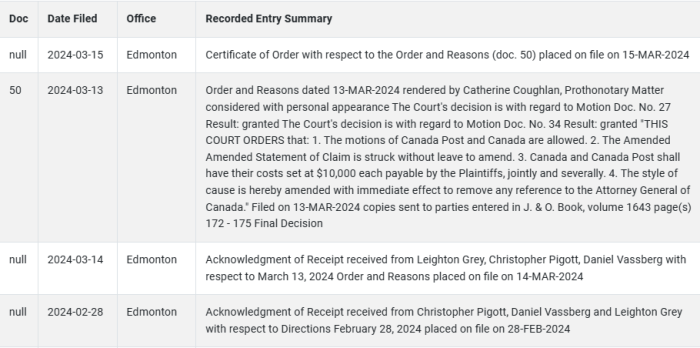
[Paragraph 1] f. A Declaration pursuant to section 217, 217.1 & 219(1) of the Criminal Code, 1985, that the Canada Post Corporation mandatory vaccination practice for covid-19 violates sections 124 & 125 of the Canada Labour Code, specifically sections (q),(s),(w) and (y), wherein the corporation demonstrated criminal negligence causing harm by not providing their employees the necessary “Informed Consent” regarding any of the potential adverse effects or dangers associated with the vaccines they provided their employees as options.
g. A Declaration pursuant to section 217, 217.1 & 219(1) of the Criminal Code, 1985, that the Canada Post Corporation violated sections 124, 125 of the Canada Labour Code, specifically sections z.03, z.04, z.05, z.06, z.11, z.13 & z.19, by failing to capture within each of the national safety minutes, any discussion to either educate, review, or document any of the potential hazards or dangers associated with their vaccination options on any of the national collective bargaining agencies that operate under Canada Post.
h. A Declaration pursuant to section 217, 217.1 & 219(1) of the Criminal Code, 1985, that the Canada Post Corporation violated sections 124, 125 of the Canada Labour Code, specifically sections (t), (v), (w) & (z), by implementing several different covid 19 vaccines as personal protective equipment in the work place. Not only failing to provide their employees with the knowledge and understanding necessary to properly use the corporation’s newly implemented personal protective equipment, the corporation also failed to ensure that said personal protective equipment be deemed safe under “…ALL conditions of their intended use.”
i. A Declaration pursuant to section 217, 217.1 & 219 of the Criminal Code, 1985, that the Canada Post Corporation violated section 127.1(1) & 128 of the Canada Labour Code, by refusing to properly investigate thousands of employee health and safety concerns regarding the vaccine products mandated for use by the Canada Post Corporation, instead, deeming the employees as “non-compliant” in the process by placing them on leave without pay status.
j. A Declaration pursuant to section 217, 217.1 & 219 of the Criminal Code, 1985, that the Canada Post Corporation violated all applicable clauses – (a) through (g) – within section 125.1 of the Canada Labour Code, by failing to review, document and disclose to their employees, the proprietary ingredients recognized as known dangerous goods contained within the vaccines that they were assigning their employees as personal protective equipment, and, by failing to inform their employees of the potential direct exposure to ethylene oxide as it pertains to the nasopharyngeal swabs used at Canada Post rapid testing sites, their employee home testing kits and when requiring their employees to confirm their positive or negative covid status by means of their mandatory PCR test process.
m. A Declaration pursuant to section 265.(1) of the Criminal Code, 1985, that the Canada Post Corporation mandatory vaccination practice for covid-19 violated section 122.(1) & 122.1 of the Canada Labour Code, by not only subjecting their employees to confusing and ineffective work place processes and expectations in relation to their covid 19 protocols, but also by subjecting their unvaccinated employees to regular psychological violence in the form of coercion or ridicule from their peers and management representatives at Canada Post.
n. Damages for violation of the Plaintiffs’ rights pursuant to sections 2, 122, 124, 125, 125.1, 127.1(1), and 128 of the Canada Labour Code as well as section 217(1) of the Criminal Code, in the amount of $500,000.00 per Plaintiff;
This is the kind of nonsense that “Mr. Bad Beyond Argument” is famous for. Here, Grey asks for all kinds of declaratory relief that the Federal Court can’t possibly grant. He’s asking a civil Court to provide criminal remedies. For obvious reasons, there’s no jurisdiction. And it’s not just a brief mention, but is in there many times.
Thankfully, the Amended Statement of Claim removes all of these. However, the fact that they were in at all shows that this lawyer has a very poor grasp of procedure. Did he not read the Action4Canada or Adelberg cases? In both cases, the Judges said that this was improper.
And these weren’t the only problems.
k. A Declaration pursuant to section 3(1) of the Genetic Non-Discrimination Act, 2017, that the Canada Post Corporation Defendants violated clause (b) specifically, by requiring them the Plaintiffs to undergo PCR testing that sampled RNA genetic material (covid-19 virus) to continue their employment at Canada Post, as per the corporation’s Defendants’ mandatory vaccination practice.
Many people cite this Act, but few know what it’s really about.
The intended use of the legislation was to ensure that people with various birth defects wouldn’t be subjected to discrimination. It could also be extended to cover race and ethnicity, which are genetic. It wasn’t designed to mean various “medical” procedures.
This was also removed from the original Claim.
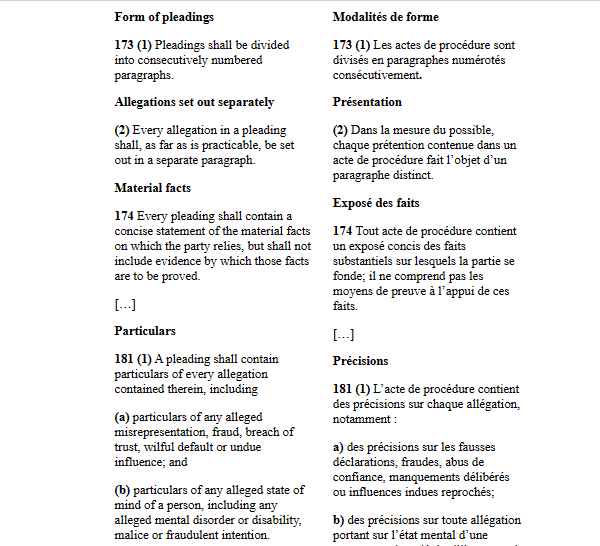
The Federal Courts Rules lay out how procedure is supposed to take place in the Court. It’s complimented by the Federal Courts Act. Together, these outline how things are done.
One of the problems with having so many Plaintiffs is that it becomes difficult to plead facts for each one. And in this case, there are no specific facts for anyone. No one is named.
At paragraphs 41 and 42 of the decision, it’s noted that it isn’t clear at all which of the Plaintiffs are even invoking religious belief as a reason to refuse the injections.
At paragraph 44 of the Amended Claim, it’s stated that the “Practice provides for accommodation, “due to a medical, religious or other prohibited ground of discrimination under the Canadian Act.” However, it’s never listed which Plaintiffs are invoking which exemption. In theory, the Claim could be rewritten like this:
Group “A” Plaintiffs refused based on religious beliefs (and list them)
Group “B” Plaintiffs refused based on medical beliefs (and list them)
Group “C” Plaintiffs refused based on conscientious objection (and spell it out)
Group “D” Plaintiffs refused based on other reasons (and list them)
Yes, the Statement of Claim would be much longer, but it least it would be clear who was refusing for what reason. In its current form, the Judge is left to guess. And it continues under “Charter violations”.
Paragraph 88: freedom of conscience under Charter s.2(a) breached
Paragraph 89: freedom of religion under Charter s.2(a) breached
Paragraph 90: right to life under Charter s.7 breached
Paragraph 91: right to liberty under Charter s.7 breached
Paragraph 92: right to security of the person under Charter s.7 breached
Paragraph 93: right to privacy of the person under Charter s.7, 8 breached
Paragraph 94: right to equality under Charter s.15 breached
While all of the “standard” Charter violations are listed, it’s unclear who is invoking which. While there will certainly be a lot of overlap, this needs to be spelled out.
There are several other torts later on, none of them properly pleaded.
Paragraph 100: tortious interference with economic relations
Paragraph 101: intention infliction of mental suffering
Paragraph 102-105: assault and battery
Paragraph 106-107: human rights violations
Paragraph 108-118: Charter violation damages, aggravated, punitive, bad faith
Yes, it’s true that the facts are to be assumed true — or at least capable of being proven — in the initial stages. But there aren’t any facts pled. There are just brief accusations, without specifics, and it’s unclear who is even alleging what. Here, it just seems like the lawyer threw in every tort he could think of, in the hopes that something would stick.
Granted, this isn’t nearly as bad as the Action4Canada or Vaccine Choice Canada pleadings. That would require real effort. But like those cases, there isn’t enough information to respond to.
And to be fair, at least this case doesn’t sue everyone in sight, exponentially driving up costs. Many others do, to their clients’ detriment.
When pleading facts, lawyers are supposed to spell out the who, what, where, when, how, etc… This is to provide enough concrete information for the Defendants to respond to. But like so many cases, there are just accusations without the detail, and they’re typically struck.
Now, if it were just the poor pleading, the Judge could have allowed the Claim to be rewritten. This often happens. In paragraph 15, it’s stated “If a pleading shows a scintilla of a cause of action, it will not be struck out if it can be cured by amendment”. It then goes on to cite Al Omani v Canada, 2017 (one of Mr. Bad Beyond Argument’s cases, which was struck).
However, since there was never any jurisdiction in Federal Court, no amount of editing would fix this problem. There are some things which editing and proofreading will never solve.
Will the lawyers be issuing refund cheques? Seems doubtful.
Note: Of course, this isn’t to justify in any way what has been happening over the last few years. All of it was uncalled for and harmful. This critique is just to outline what went wrong for the “Posties”. Do not interpret it as any sort of justification for Government tyranny.
ARBITRATION:
(1) https://www.cupw.ca/sites/default/files/urb-ja-31-2022-ca-en.pdf
(2) Canada Post Collective Bargaining Agreement 2022
(3) Canada Post Arbitration update, February 2022 (removed)
(4) Wayback Machine Archive
(5) CUPW On Some Updates On Arbitration
(6) Wayback Machine Archive On Arbitration Updates
(7) https://www.cupw.ca/en/last-days-arbitration-vaccination-practice-grievance
(8) Wayback Machine Archive Of April 1st, 2022 Update
(9) https://www.cupw.ca/en/arbitrator-dismisses-grievance-against-canada-post%E2%80%99s-mandatory-vaccination-practice
(10) Arbitration Decision (Removed)
(11) Canada Post Arbitration Ruling, Full Text
(12) Wayback Machine Archive Of Arbitration Decision
(13) https://www.fct-cf.gc.ca/en/court-files-and-decisions/court-files#cont
LITIGATION:
(1) Canada Post Amended Statement Of Claim June 7 2023
(2) Canada Post Decision Striking Amended Pleading
OTHER LAWS AND DECISIONS
(1) https://www.canlii.org/en/bc/bcsc/doc/2022/2022bcsc1507/2022bcsc1507.html#par52
(2) https://www.canlii.org/en/ca/fct/doc/2023/2023fc252/2023fc252.html#par51
() https://www.canlii.org/en/ca/fca/doc/2015/2015fca20/2015fca20.html
() https://www.canlii.org/en/ca/fct/doc/2017/2017fc786/2017fc786.html#par32
(3) https://laws-lois.justice.gc.ca/eng/regulations/sor-98-106/index.html
(4) https://laws-lois.justice.gc.ca/eng/acts/F-7/FullText.html
(5) https://laws-lois.justice.gc.ca/eng/acts/P-33.3/

Lawyers … sigh.